Suehiro’s eviction sparks an outcry in Little Tokyo, with legacy business registry on the way
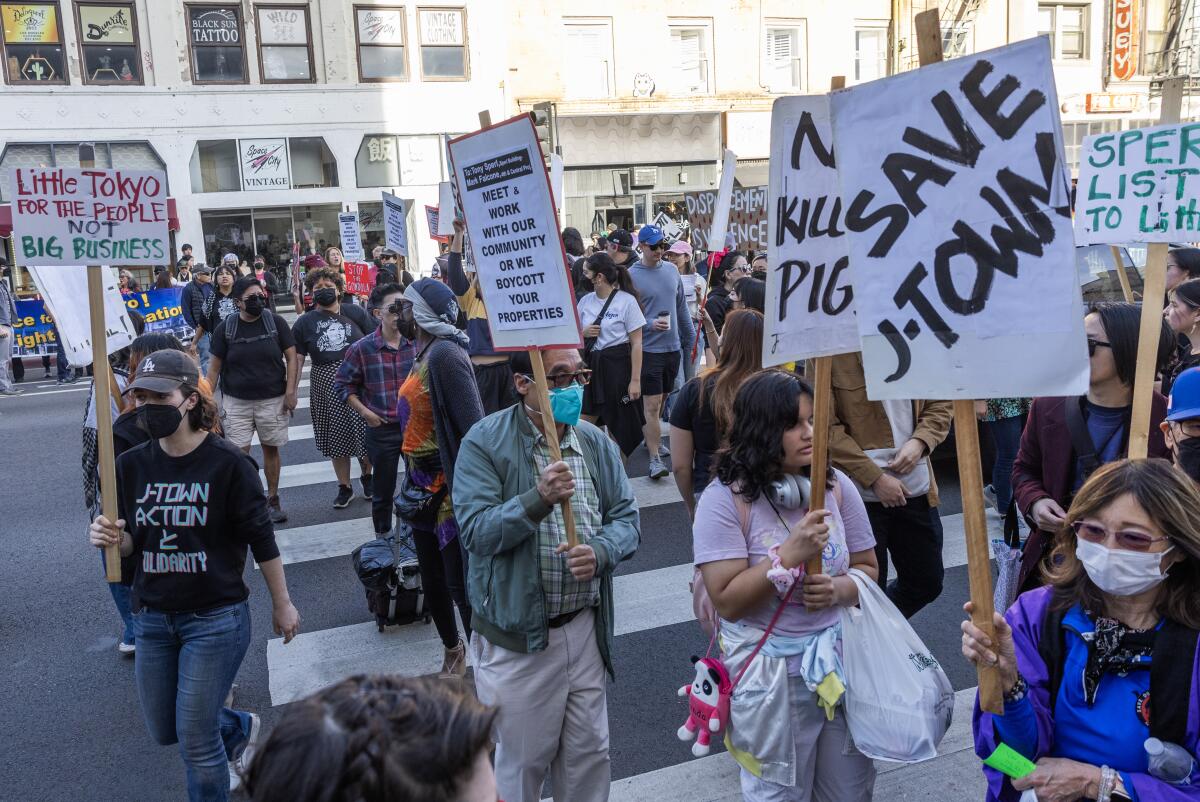
- Share via
The signs at Sunday’s rally protesting the eviction of Little Tokyo’s Suehiro Cafe offered a full menu of the different ways a community can be angry.
“Sperl go to hell,” read one sign directed at Suehiro’s landlord, Anthony Sperl. That’s a common sentiment among the younger activists from J-Town Action and Solidarity, a group that has made headlines for its confrontational tactics.
Another sign struck a more diplomatic tone: “Save Little Tokyo.” That one was waved by a member of Nikkei Progressives, an activist group whose membership trends older.
And others skipped the civilities entirely: “Killer Cops GTFO,” read one, referring to Sperl’s past career as a police officer in Stanton where he shot a 5-year-old boy in a killing ruled accidental.
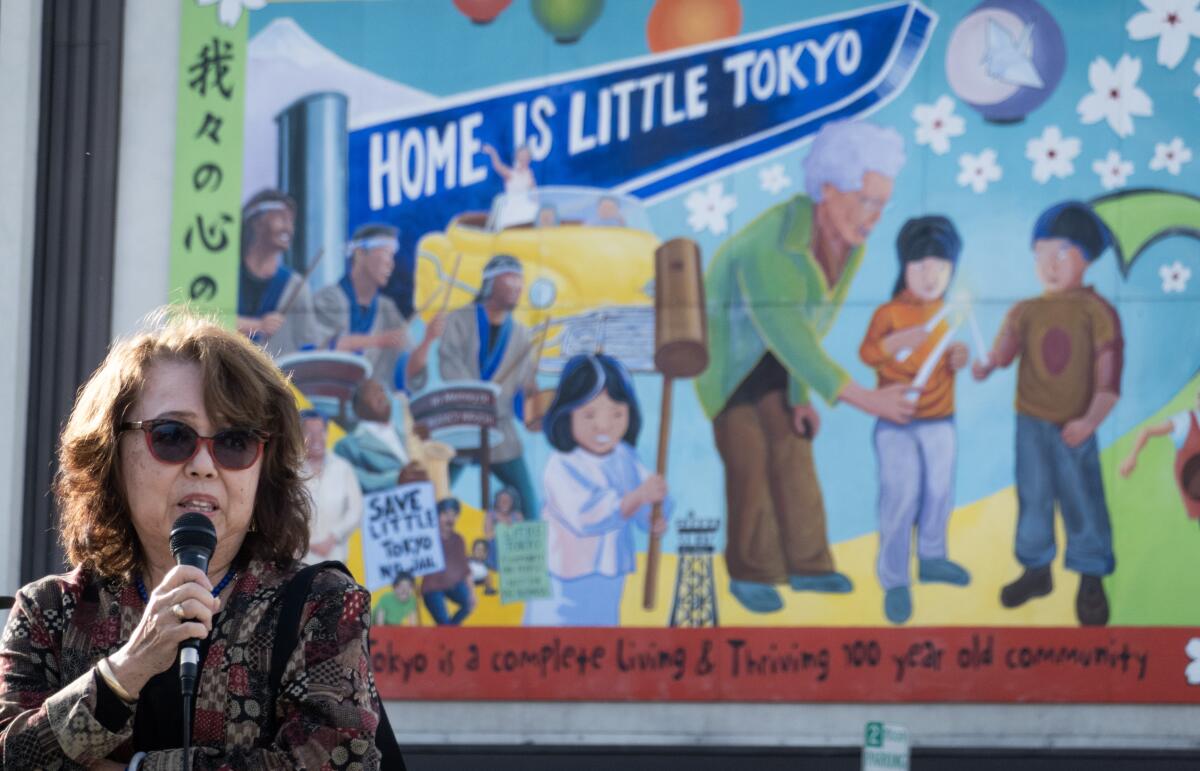
Community groups often disagree about issues such as policing and homelessness, but Suehiro’s forced relocation has prompted an unexpectedly broad outcry in Little Tokyo. The news landed hard in a community that was already fighting battles on multiple fronts, and the signs spoke to that too.
Barely legible on the back of a reused placard were the words: “You can’t hide Keiro,” a slogan from an older protest of a community nonprofit’s mishandling of a Japanese American senior nursing home.
In 2021, I wrote about how that facility, which housed overflow patients from county hospitals during peak pandemic times, recorded the most deaths in the state. Suehiro Cafe’s founder Junko Suzuki was one of those who died.
Sperl began eviction proceedings for Suehiro Cafe in February, alleging that the 51-year-old business’ owner had failed to pay rent. But owner Kenji Suzuki never failed to send the checks, said Suehiro’s attorney, Clifford Jung.
State business license records show Sperl had other plans for the property, listing him as a partner in a limited liability corporation called Tokyo Greens, registered in 2018 at Suehiro’s building’s address. Sperl and his attorney, Dennis Block, did not respond to requests for comment.
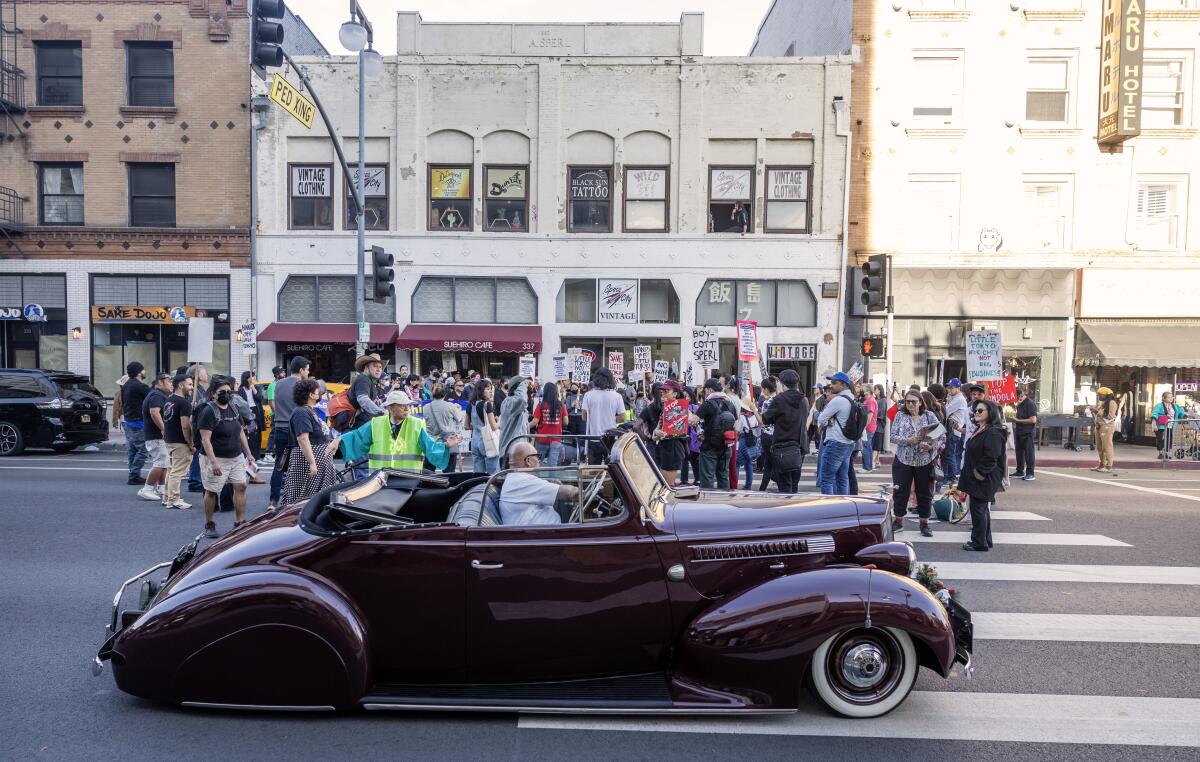
When the eviction letter came, Suzuki was still grieving the death of his mother, Junko. He tried to accept relocation and has since opened a spot on Main Street. But so many people reached out after news spread of Suehiro’s fate that he felt inspired to fight on.
“I felt like I was abandoning the ship and leaving all my friends. We’ve all put so much hard work into Little Tokyo,” Suzuki said.
Suehiro is only one of the several storied Little Tokyo businesses facing displacement in the coming months, said Mariko Lochridge, a local business advocate. Little Tokyo Arts & Gifts is also facing relocation or closure. Anzen Hardware is moving to a building down the street. And last year, Little Tokyo Cosmetics was forced to leave its space on the eve of celebrating its 50th anniversary.
Suzuki was willing and able to pay reasonable rent increases, Jung said, but Sperl refused to negotiate or offer a lease.
Evictions and displacements are fueling broad protests in neighborhoods all over Los Angeles. Sunday’s protest, attended by more than 100 people, also featured activists from Boyle Heights who wanted to draw attention to a proposed mixed-use housing project on Cesar E. Chavez Avenue that threatens to displace the restaurant El Appetito and several other shops.
It’s too late to save Suehiro’s original location, but help is on the way for businesses that have been in operation for at least 20 years.
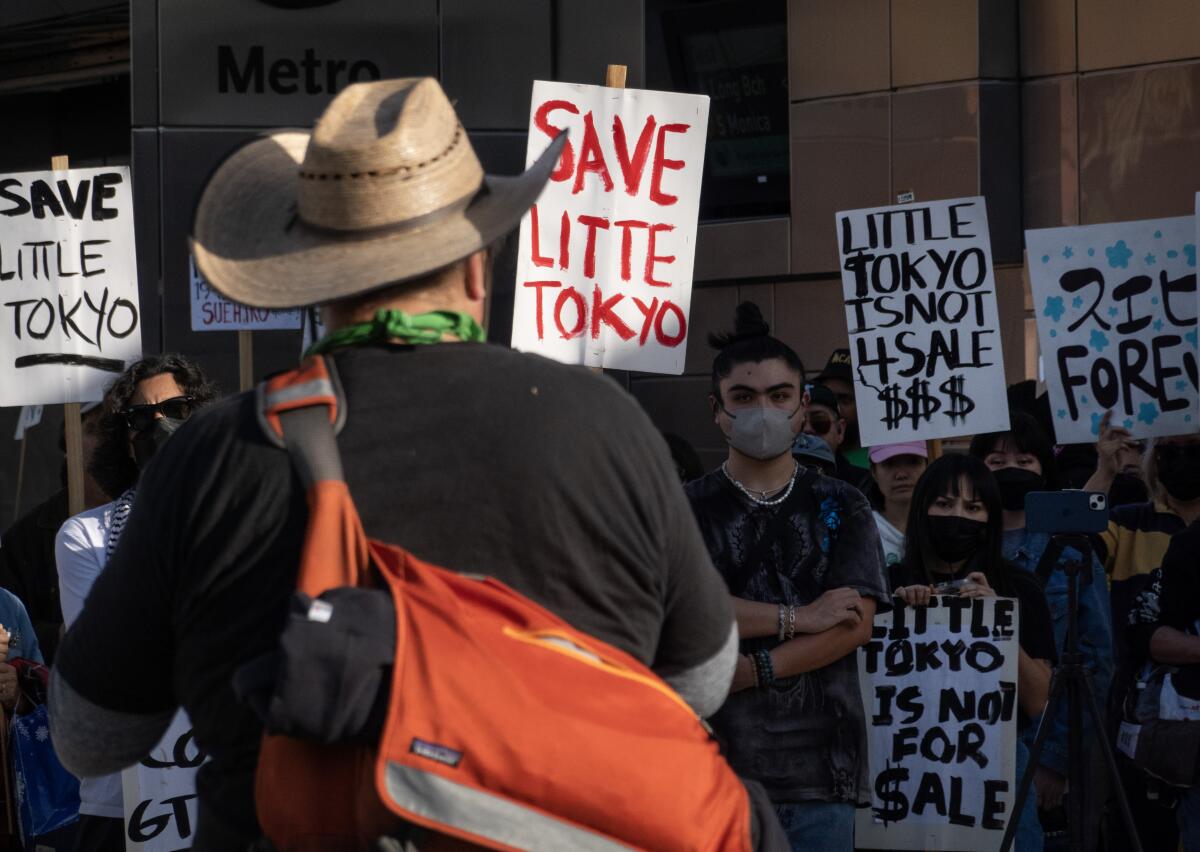
In January, the city’s Economic and Workforce Development Department will open applications for the new Los Angeles Legacy Business program, which will offer improved access to city services, other technical assistance and about $3.6 million in grants to be distributed among 245 businesses.
Each council district gets a minimum of 10 legacy businesses listed on the registry, which will prioritize businesses that face an imminent threat of displacement and those in low-income areas. Businesses listed on the registry will also get official branding in the form of window clings and promotion on official city websites, such as on an online registry.
The grants — $10,000 for businesses with up to five employees and $20,000 for those with more than five — are funded by one-time American Rescue Plan dollars. But city officials say they plan to expand the program and seek other sources — community development block grants, for example.
“Right now it’s more of a celebratory program intended to promote these businesses,” said Nyssa Buck, senior management analyst at the Economic and Workforce Development Department.
The program doesn’t offer any protections that might have saved Suehiro Cafe or any other tenant with a landlord hostile to their presence, though Buck said the city wants to explore stronger protections for legacy tenants.
But I’m just glad the city is finally directing some funds toward fighting gentrification’s worst effects. I can think of several beloved community institutions that might still be open if they had an extra $10,000.
Gentrification’s opponents are easily demonized as impractical people unable to accept change and the realities of the market. But they can just as easily be understood as people trying to maintain an connection to home. I think anger over gentrification reflects the frustration of people who have lost the power to shape their own neighborhood. It’s what anyone might feel when forced from their roots.
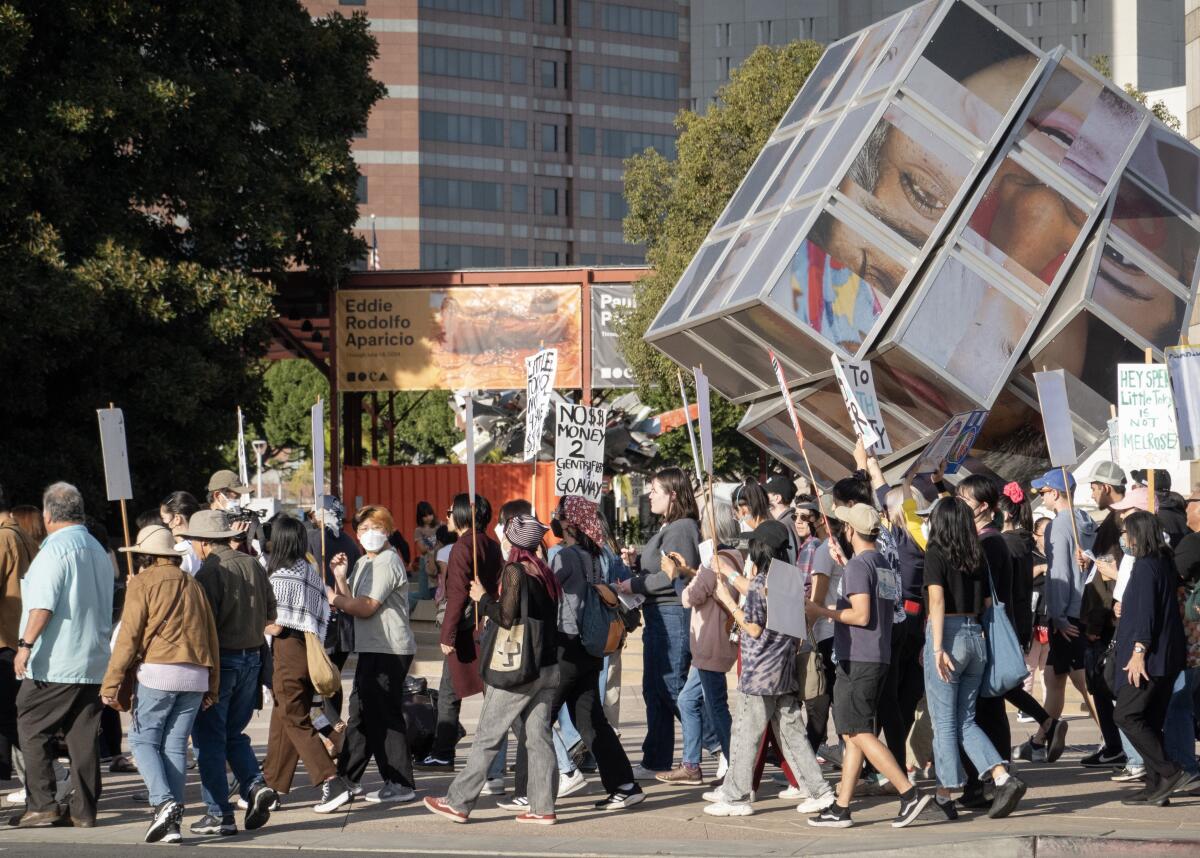
It’s important the city recognizes that. Because there’s not just anger in anti-gentrification fights, but also optimism for what government can be. Not just a set of rules for what you can and can’t do with property, but a tool for us to create the communities we want to live in.
I don’t think the real estate market will ever generate friendly conditions that keep beloved community institutions alive. I would argue that it never has — you’d be surprised to hear how many well-known institutions still exist only because a landlord decided not to charge market rate.
Suzuki, 61, understands these things. He is a businessman who used to sell cars and even went to get his MBA. But he left his career and his degree unfinished to take over the restaurant in 2001. It wasn’t a business decision, but an emotional one. His mom needed help.
The restaurant felt as integral to him as any body part, Suzuki said. He grew up there, first running around with all the kids in the neighborhood as his mom worked. Then, every summer since in the sixth grade, he worked there with his mother, washing dishes, chopping vegetables and tearing down chickens.
When Junko Suzuki opened Suehiro with her sister Yuriko in 1972, they were only looking to create a place to play their favorite game, mah-jongg. But they became some of the first female business owners in the neighborhood. They made Suehiro Cafe into a place of comfort, stability and abundance for a community that badly needed it.
For Kenji, the restaurant became a living legacy of struggles faced and overcome. It’s also the home base of a community built by his mother’s kindness and strength of character. And it was all possible because Sperl’s parents, Suehiro’s previous landlords, saw value in Junko’s business beyond the rent, Kenji said.
“It makes me genuinely sad that he and his family have been here so many years, and he doesn’t recognize that it’s Japanese people that made that area a special place,” Kenji said. “For him to disregard all of that is really sad.”
Kenji has to vacate in January. Suehiro’s new location is a larger, more modern space at Main and 4th streets.
But he insists it’s not a permanent relocation. As soon as he can find a spot, he wants to move back home, to Little Tokyo.
More to Read
Sign up for Essential California
The most important California stories and recommendations in your inbox every morning.
You may occasionally receive promotional content from the Los Angeles Times.














